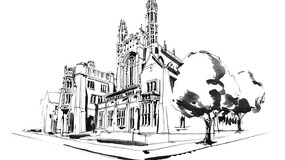
Professor Abbe R. Gluck Named Chair of Fund for Modern Courts
Professor Abbe R. Gluck ’00 was named chair of the board of directors of The Fund for Modern Courts, succeeding William C. Silverman as of January, the organization announced on Dec. 12.

Look Back at a Blockbuster Fall for Faculty Books
Yale Law School had a bounty of faculty book in 2025, with four faculty members publishing new works just this fall.

AI and ChatGPT Push Students and Faculty to Take a Deeper Look at the Law
As AI continues to overtake almost every sector of modern society, Yale Law School is utilizing this moment to encourage its students to explore the tool’s implications and prepare for an ever-changing technological world and legal landscape.
Ready for Launch
A look at the progress of the first two cohorts of the Launchpad Scholars Program on their journey to law school.

What They’re Saying About Cristina M. Rodríguez, Incoming Dean of Yale Law School
Learn what colleagues, peers, and leaders from across the country are saying about Cristina Rodríguez and the experience, judgment, and values she will bring as the next dean of Yale Law School.

Cristina Rodríguez Selected as Next Dean of Yale Law School
Rodríguez will assume the deanship on Feb. 1, 2026, as the Sol and Lillian Goldman Dean and Professor of Law at Yale Law School.

Student Lounge Dedicated to Paul C. Tsai ’54 LLM, ’57 JSD
To honor the outstanding generosity of Joseph C. Tsai ’90 to Yale Law School as well as the memory of his father, Paul C. Tsai ’54 LLM, ’57 JSD, the student lounge in Sterling Law Building has been named the Paul C. Tsai Student Lounge.

New Course Explores Legal Strategies for Nonprofit Resilience
Professor Gerald Torres is leading a new course, "Nonprofit Organizational Defense," that trains students to help nonprofits navigate a challenging legal environment.





